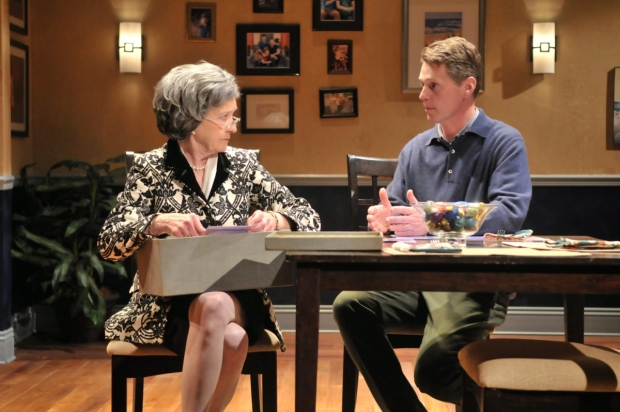Mothers and Sons

(© Craig Bailey)
Terrence McNally’s Mothers and Sons, a 2014 Tony nominee for best play, might have been radical several decades ago, but the subject of two married men who are raising a son has ceased to be an issue in 36 states in America. Although many of the conversations between the characters deal with surviving the past plague of AIDS, the central premise of two men married to each other and living normal lives marks this play as a contemporary work for McNally, whose earlier works chronicled the 20th century’s difficulties and joys in recognizing the nation’s gay community. Even though the pain of the losses sustained from AIDS have been the mined in countless dramas, the sensitive direction of a fine ensemble of actors in the SpeakEasy Stage production throws new light on emotions that will not stay buried.
The play begins when Cal and Will’s ordinary routine is interrupted by an unannounced visit from Katherine, Cal’s previous lover Andre’s mother. Cal and Andre were partners for six years before Andre became ill and died of an AIDS-related illness when he was 29 years old — 20 years ago. Katherine has not been in touch with Cal, even though he tried to forge a relationship with her. Unlike Katherine who is a recent widow and still bitterly mourns the death of her only child, Cal moved on after eight years and met and married Will, a much younger man. Cal and Will’s lives now revolve around their 6-year-old, Bud, who comes bounding in from playing in Central Park and immediately takes to Katherine. She has come to return Andre’s diary to Cal, which neither of them has had the courage to read.
Katherine, as portrayed by Nancy E. Carroll, is a tightly wound, insulting bundle of repression and grief. Dressed in a shaggy mink coat, suit, and gloves, she is the image of the proper Dallas matron, who drinks too much and has too much time on her hands. Katherine has previously appeared in McNally’s 1988 playlet Andre’s Mother, where he introduced her as the silent character at Andre’s funeral. In this version, however, Katherine talks — a lot — using her words as weapons. She has never accepted that her son was gay, even though Andre left home for New York at age 18. Nor can she hide her anger at Cal’s new life. She is also a force to be reckoned with, as eloquent in her moments of silence as when she is hurling accusations later in the play. She never leaves the stage for the entire one hour and forty minutes.
Michael Kaye as Cal is equally affecting, as he looks for a way to soothe Katherine’s sorrow, but cannot hide his growing anger at her behavior. Kaye is a physical actor, taking his cue for relationships by reaching out and touching, even someone as remote as Andre’s mother. Nile Hawver is a good foil for Cal in his openness. He cannot hide his feelings of jealousy about Andre, nor his dislike of Katherine’s intrusion. Liam Luker as Bud is a charmer who finally burrows into the woman’s protective armor.
To be sure, the play slows down a bit at several holier-than-thou soliloquies, and Bud’s sentimental appeal might feel manipulative; however, all of the actors are so believable in their reactions that you’d have to be a stone to be unmoved by the end. Paul Daigneault’s pitch-perfect direction of an afternoon in a familiar-looking apartment on Central Park West, designed by Erik D. Diaz, serves to make this production a quiet but earth-shattering moment in the progression of the 21st century.










